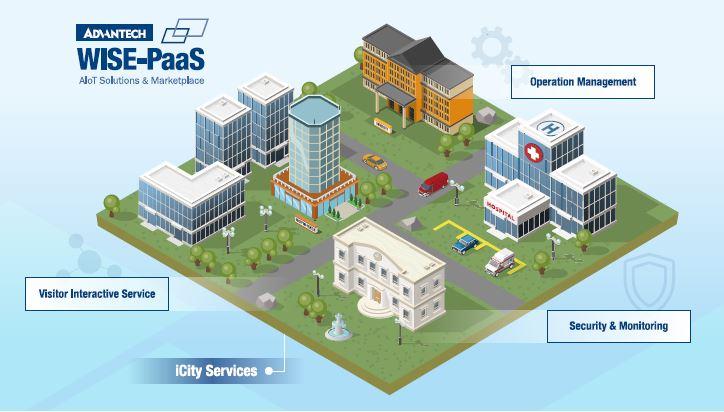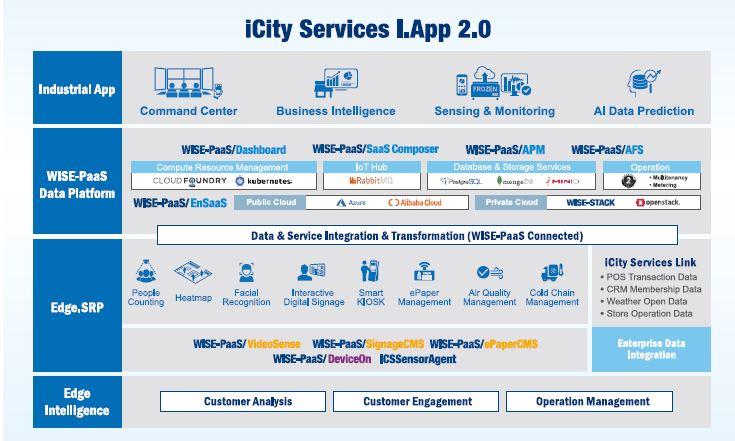WISE-PaaS
WISE-PaaS Platform Architecture Accelerates Implementation of Industrial IoT Applications in Public Spaces

Images provided by Advantech
Interview with HS Su, Director of Service-IoT Product Solution Divsion, Advantech
Introduction
To realize a broader implementation of IoT applications for smart cities, the Intelligent City Services (iCS) division under Advantech’s Service IoT (SIoT) Group is collaborating with partners to co-create industrial applications on the WISE-PaaS platform, focusing on public spaces such as museums, entertainment venues, restaurants and airports in order to build a smart future for urban areas.
Even though it has been nearly 10 years since the emergence of IoT, the problem of fragmentation prevented enterprises from duplicating applications rapidly, slowing down development. However, with the launch of the WISE-PaaS platform in 2014, Advantech began integrating resources and advocating co-creation based on actual demand for smart applications in various sectors. Utilizing its experience in application innovation and knowledge of vertical industries accumulated over the past five years, Advantech plans to promote the WISE-PaaS Marketplace 2.0 software store in 2020, taking into account both market and technology developments in order to accelerate the implementation of IoT applications globally and unlock the full potential of IoT.
In line with Advantech’s overall corporate goals, the SIoT Group is redefining its focus. According to HS Su, Director of Advantech Service-IoT (SIoT) Product Solution Divsion, the SIoT Group is dividing the market into three categories: retail, healthcare, and intelligent city services (iCS). With regard to technology, decoupling and refactoring are carried out on the WISE-PaaS platform to allow system integrators (SI), software developers, technology innovators and other co-creation partners to access and utilize function modules more quickly and efficiently. By working together, industrial applications can be developed and uploaded to WISEPaaS Marketplace 2.0 even quicker to comprehensively grow industrial IoT applications.
People-centric iCS applications
According to Su, the SIoT Group added the iCS segment because it found that smart city was often put in categories such as smart transportation, smart retail, smart logistics, or smart healthcare. Many urban public spaces such as airports, museums, restaurants and amusement parks were grouped under smart retail, even though the business and services in these spaces are very different from those in the retail sector. To more accurately develop standardization of smart applications in these spaces, they had to be separated from retail and given their own category—iCS.
The meaning of iCS is to provide services based on people-centric values. Su pointed out that while industry 4.0 emphasizes improvement in productivity and quality and smart transportation is directed at greater convenience, iCS focuses on people by creating smart services and digitalizing operational management. Three groups of people need to be served. Firstly, service personnel must be equipped to easily and efficiently provide services to customers through smart applications and interact with them in a positive manner. Secondly, customers must be made to feel comfortable through smart applications in restaurants, airports, museums, and other public spaces, which is critical for business owners in creating higher value-added services. Lastly, administrators must be empowered to improve management with the help of smart systems; the importance of data analysis in enhancing service flows and customer services cannot be overstated.
With a people-centric mindset, Advantech’s iCS software engineers often visit the spaces for which they are developing application systems, so as to experience the on-site situation firsthand from the perspective of the end-user. In this way, the engineers can develop application services that conform to actual needs. Su gave an example about a project in which an engineer opposed the specifications set by the project manager. The engineer visited the site personally to examine it first hand, discovering that the proposal put forward by the project manager was actually correct and did indeed satisfy user demand. This shows that taking the initiative to think from the perspective of end-users is a worthwhile exercise that strengthens communication and teamwork. Su said since this incident, this engineer always shares and discusses with colleagues new applications in amusement parks, museums, and restaurants he has seen during overseas trips.
Accelerating smart co-creation with WISE-PaaS and Marketplace 2.0
Apart from a people-centric service mindset and an organizational structure that matches market demand, Advantech has developed various types of industrial applications through decoupling and refactoring. By uploading them to the WISE-PaaS Marketplace 2.0 software store and allowing partners to easily participate in co-creation, Advantech can solve the issues of fragmentation and duplication in IoT applications.
Su stated that decoupling is divided into two parts. The first part is the decoupling of data. By putting data on the open WISE-PaaS platform, partners and customers can easily access the data and use it to build new industrial applications, improving productivity and resource efficiency. This part of decoupling is not particularly challenging, and has been fully activated. The second part is the decoupling of key services, which is to disassemble application services that have already been developed into many smaller apps. Because this involves redevelopment, it is more challenging. Therefore, Advantech is planning a Kubernetes (K8s) microservices architecture, based on the WISE-PaaS 4.0 platform, to realize the decoupling of key services.
Taking the iCS applications of the SIoT Group as an example, there are common applications (Common Apps) on WISE-PaaS Marketplace 2.0 suited for all industries, such as dashboard, notification, and OTA applications.
Then there are industrial applications (Industry Apps) that are developed either by Advantech or by SIs, such as people counting analytics, signageCMS management, and air quality management applications. And finally, there are domain-focused applications (Domain Apps), which cannot be standardized and require a high degree of customization, such as applications for indoor navigation and guided tours in museums. Applications like these are co-created by Advantech, SIs, and software developers.
Su elaborated that industrial applications developed by Advantech on the WISE-PaaS platform for general use can be directly provided to customers. However, for certain vertical markets, Advantech and its partners use the industrial applications as the basis to develop customized domain-focused applications for specific requirements, and then upload them to the WISE-PaaS Marketplace. Both industrial and domain-focused applications are open for redevelopment and re-innovation by other developers. Thus, through such a virtuous cycle, applications can be developed that precisely meet demand in each sector.
Further boosting worldwide adoption of IoT applications in the coming five years
In the iCS field, Advantech has already established partnerships with numerous SIs to jointly engage in cocreation. For example, International Integrated Systems, Inc. (IISI), a company with over 30 years of experience in building professional information systems, has used WISE-PaaS to develop industrial and domain-focused applications for the smart city sector. In the future, IISI will use these as the basis to collaborate with other developers on the WISE-PaaS platform to develop even more industrial applications. The number of applications on the platform will thereby increase exponentially. “Within three to four years, the WISE-PaaS platform will become one of the most important platforms for global industrial IoT applications,” said Su.
When promoting smart applications in the past, Advantech concentrated primarily on embedded/ pre-installed software, with a strong focus on the performance and reliability of the hardware. But in the past five years, Advantech has placed greater emphasis on software development specifically for applications. For this, Advantech requires co-creation with even more SIs and software developers, so as to gather the greatest possible momentum in accelerating the implementation of smart applications and fostering advanced and smart lifestyles for generations to come.


 Industrial Automation
Industrial Automation Edge Computing
Edge Computing Industrial Networking
Industrial Networking Intelligent Connectivity
Intelligent Connectivity HMI’S & Panel Meters
HMI’S & Panel Meters Industrial Rugged Mobile Platform
Industrial Rugged Mobile Platform Cyber Security
Cyber Security Oil & Gas
Oil & Gas Power and Energy
Power and Energy Intelligent Transportation
Intelligent Transportation Smart City & IoT
Smart City & IoT Smart Factory
Smart Factory Industrial Cloud Solution (IIoT)
Industrial Cloud Solution (IIoT) Water And Waste Water
Water And Waste Water Building Management System (BMS)
Building Management System (BMS) Security & Surveillance
Security & Surveillance